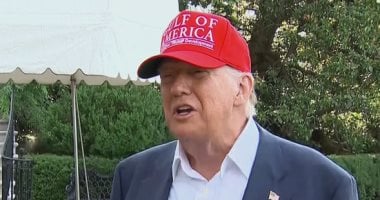Dr. Bilal Shaib, an economic expert, emphasized that the tariff reduction agreement between the United States and Vietnam marks a strategic turning point in their economic relations. He pointed out that the previous U.S. administration under President Donald Trump pursued policies based on direct economic interests rather than ideologies, which enhances opportunities for expanding bilateral trade.
During an appearance on Extra News, Shaib noted that trade volume between Washington and Hanoi surged to $149.6 billion by the end of 2024. He explained that this agreement will allow for expanded U.S. exports, especially considering the U.S. trade deficit, which reached $1.2 trillion. Shaib added, “Trump aims to reduce this deficit by opening new markets and securing raw material supplies without relying entirely on traditional partners such as China, Canada, and Mexico, which together account for about 46% of U.S. foreign trade.”
Regarding the opening of Vietnamese markets to American cars without tariffs, Shaib clarified that this move aims to support the U.S. automotive industry, which faces declining domestic demand in favor of imported vehicles due to price and added value factors. He stated, “The United States needs to fundamentally develop its automotive industry to compete with countries like China, particularly in the rapidly evolving electric vehicle sector.”
The economic expert noted that China was among the first to oppose the new agreement due to its potential impact on Chinese sales and global industrial dominance. China holds about 30% of the global industrial sector, compared to only 15% for the United States. Shaib highlighted that China’s economy has grown more than 15 times over the past 15 years, while U.S. economic growth has not exceeded double that period, placing Washington in a defensive economic position that requires smart trade moves like the Vietnam deal.
Dr. Bilal Shaib concluded by emphasizing that major economic shifts are not solely driven by agreements but require comprehensive and competitive industrial strategies. He pointed out that what is happening now is a reshaping of the international trade map amid fierce competition among major economic powers, led by the United States and China.
— news from ‘اليوم السابع’
— News Original —
خبير: اتفاق التجارة الحرة بين أمريكا وفيتنام خطوة اقتصادية تُقلق الصين
أكد الدكتور بلال شعيب، الخبير الاقتصادي، أن اتفاق تخفيض الرسوم الجمركية بين الولايات المتحدة وفيتنام يمثل نقطة تحول استراتيجية فى العلاقات الاقتصادية بين البلدين، مشيرًا إلى أن الإدارة الأمريكية بقيادة الرئيس السابق دونالد ترامب تنتهج سياسات قائمة على المصالح الاقتصادية المباشرة بعيدًا عن الأيديولوجيات، وهو ما يعزز فرص زيادة حجم التبادل التجاري. n nوقال شعيب، فى مداخلة على قناة إكسترا نيوز، إن حجم التجارة بين واشنطن وهانوى قفز ليصل إلى 149.6 مليار دولار بنهاية 2024، مؤكدًا أن هذه الاتفاقية ستسمح بتوسيع الصادرات الأمريكية، خاصة فى ظل عجز هيكلى مزمن فى الميزان التجارى الأمريكى بلغ 1.2 تريليون دولار، مضيفًا: “ترامب يسعى لتقليص هذا العجز عبر فتح أسواق جديدة، وتأمين احتياجات بلاده من المواد الخام بعيدًا عن الاعتماد الكامل على شركاء تقليديين مثل الصين وكندا والمكسيك، الذين يمثلون معًا نحو 46% من تجارة أمريكا الخارجية”. n nوفيما يتعلق بفتح الأسواق الفيتنامية أمام السيارات الأمريكية دون رسوم جمركية، أوضح شعيب أن هذه الخطوة تهدف إلى دعم صناعة السيارات الأمريكية التى تعانى من تراجع الإقبال المحلى لصالح السيارات المستوردة، نظرًا لعوامل السعر والقيمة المضافة. وقال: “الولايات المتحدة بحاجة لتطوير صناعتها بشكل جذرى لمنافسة دول مثل الصين، خاصة فى قطاع السيارات الكهربائية، والذى يشهد تطورًا متسارعًا عالميًا”. n nوأشار الخبير الاقتصادى إلى أن الصين كانت أول المعترضين على الاتفاق الجديد، نظرًا لتأثيره المحتمل على مبيعاتها وتفوقها الصناعى العالمى، حيث تستحوذ على نحو 30% من القطاع الصناعى العالمى، مقابل 15% فقط للولايات المتحدة. ولفت إلى أن الصين نَمَت اقتصاديًا خلال الخمسة عشر عامًا الماضية بما يزيد عن 15 مرة، فى مقابل نمو محدود للاقتصاد الأمريكى لم يتجاوز مرتين، مما يضع واشنطن فى موقع دفاع اقتصادى يتطلب تحركات تجارية ذكية مثل الاتفاق مع فيتنام. n nواختتم د. بلال شعيب تصريحه بالتأكيد على أن التحولات الاقتصادية الكبرى لا تصنعها الاتفاقيات وحدها، بل بناء استراتيجية صناعية شاملة وتنافسية، مشيرًا إلى أن ما يحدث حاليًا هو إعادة تشكيل للخريطة التجارية الدولية فى ظل تنافس شرس بين القِوَى الاقتصادية الكبرى، وعلى رأسها الولايات المتحدة والصين.
